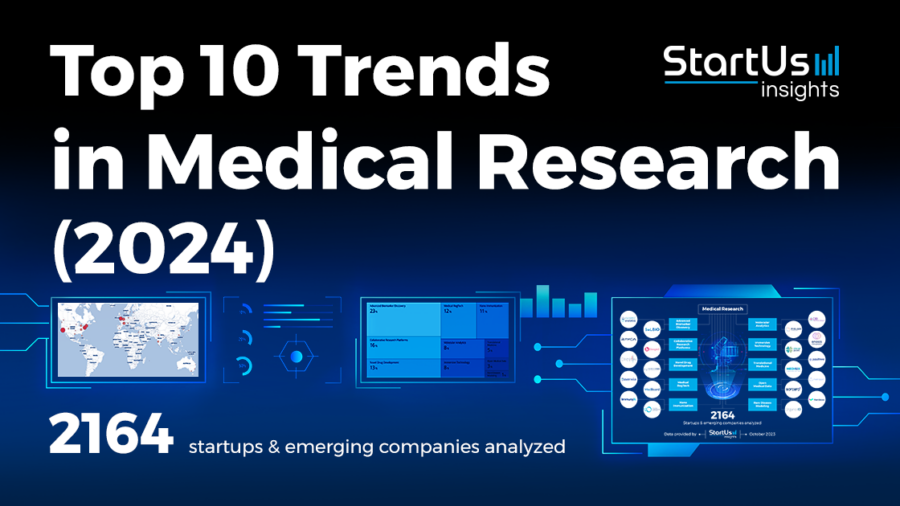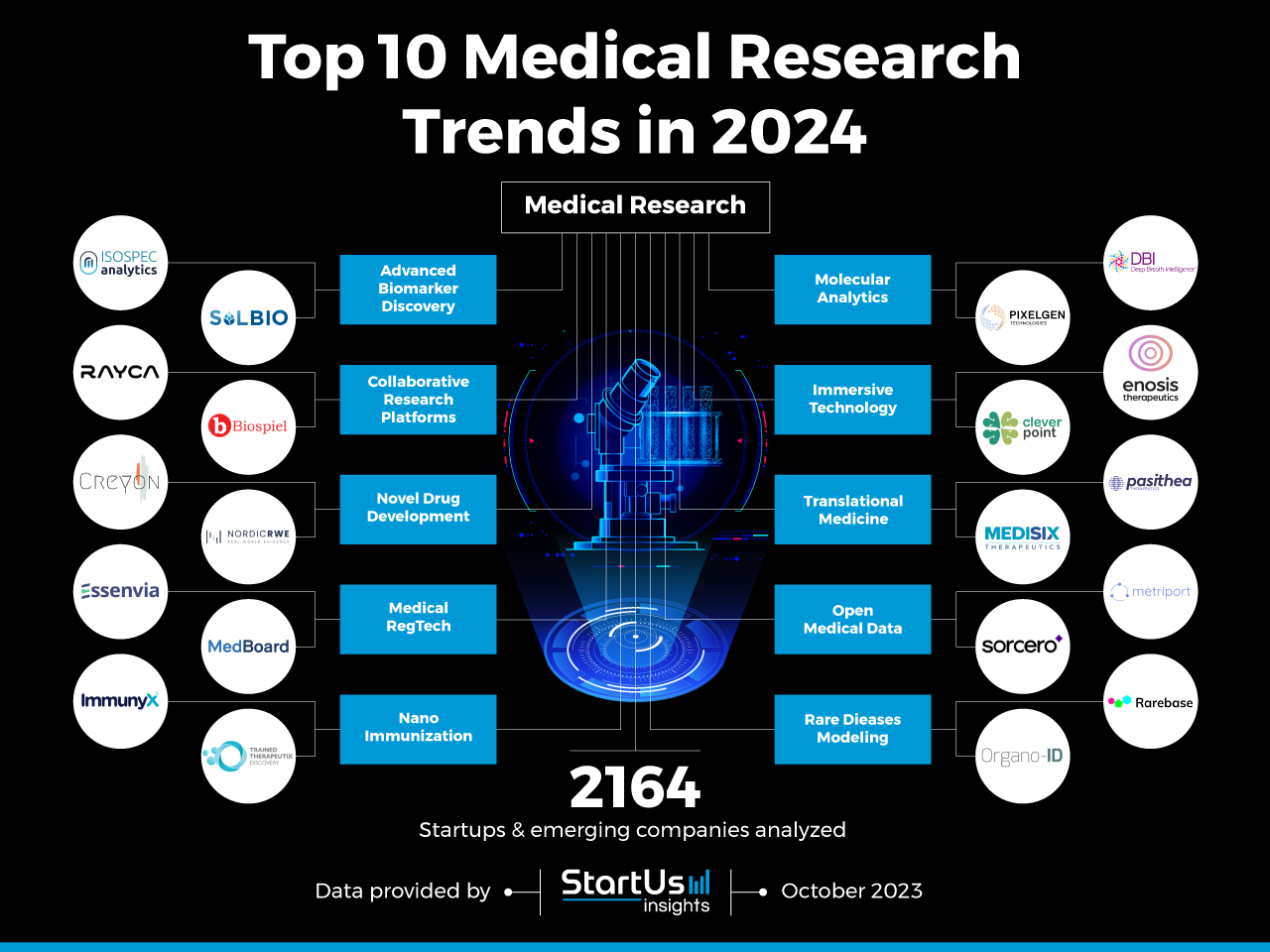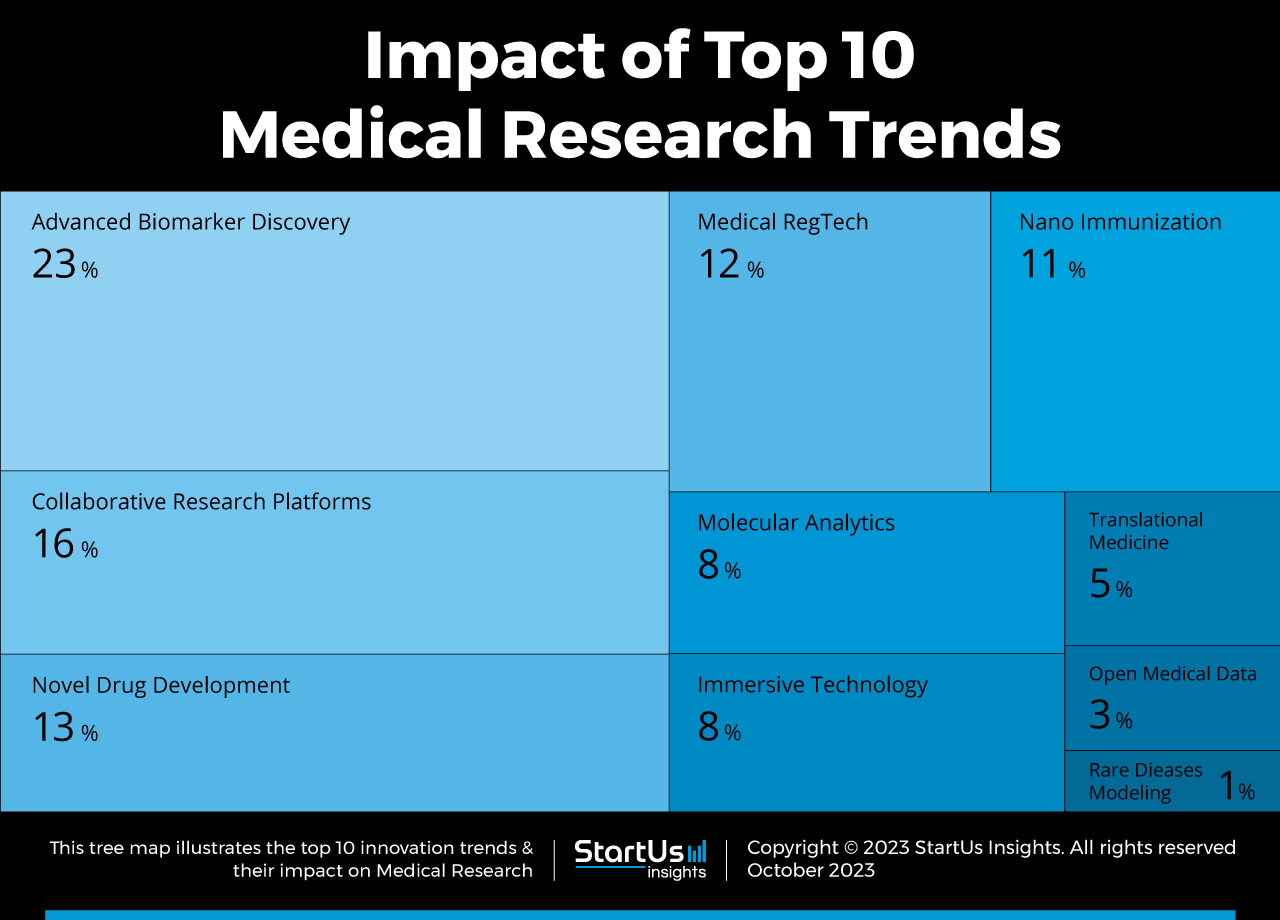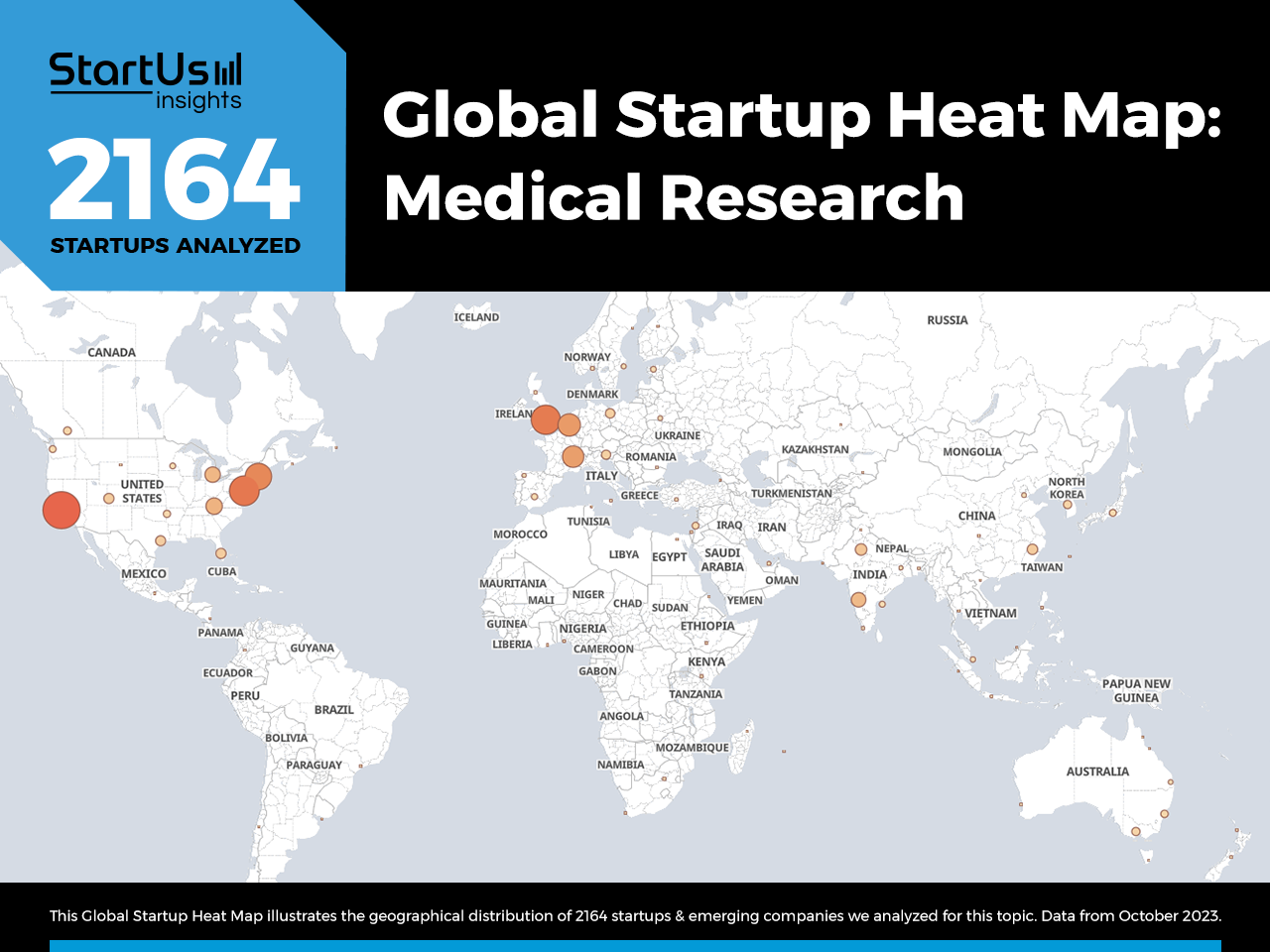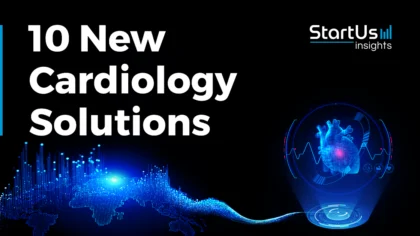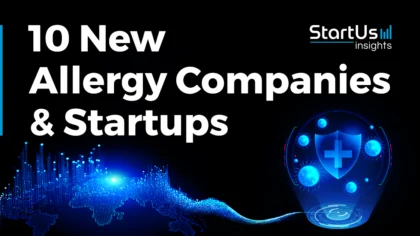The medical research industry advances human health and combats diseases, yet faces significant challenges from high costs and lengthy drug approval processes to reproducibility. However, the landscape is rapidly evolving. Advanced data analytics and artificial intelligence, as well as cutting-edge lab equipment and personalized medicine, expedite research processes. These trends in medical research enhance accuracy and tailor treatments to individual patients. The integration of these innovations addresses the industry’s pressing concerns and also paves the way for more efficient, precise, inclusive, and patient-centric healthcare.
Top 10 Medical Research Trends in 2024
- Advanced Biomarker Discovery
- Collaborative Research Platforms
- Novel Drug Development
- Medical Regulatory Technology
- Nano Immunization
- Molecular Analytics
- Immersive Technologies
- Translational Medicine
- Open Medical Data
- Rare Disease Modeling
Innovation Map outlines the Top 10 Trends in Medical Research & 20 Promising Startups
For this in-depth research on the Top Trends in Medical Research and startups, we analyzed a sample of 2000+ global startups & scaleups. This data-driven research provides innovation intelligence that helps you improve strategic decision-making by giving you an overview of emerging technologies in medical research & development. In the Medical Research Innovation Map below, you get a comprehensive overview of the innovation trends & startups that impact your company.
These insights are derived by working with our Big Data & Artificial Intelligence-powered StartUs Insights Discovery Platform, covering 3 790 000+ startups & scaleups globally. As the world’s largest resource for data on emerging companies, the SaaS platform enables you to identify relevant technologies and industry trends quickly & exhaustively.
Tree Map reveals the Impact of the Top 10 Trends in Medical Research (2024)
Based on the Medical Research Innovation Map, the Tree Map below illustrates the impact of the Top 10 Medical Research Trends in 2024. Innovations in advanced biomarker discovery and molecular analytics enable the identification of unique biological markers and streamline early disease detection. They form the biggest share of emerging trends in medical research.
Collaborative research platforms further promote information sharing, accelerating the development of medical technology, including rare disease modeling. Further, novel drug development and nano-immunization deliver targeted treatments at the molecular level, increasing efficiency and reducing side effects. Besides, medical regulatory technology ensures swifter and safer drug approvals by pre-screening compliance and regulation policies.
Immersive technology, like VR and AR, enhances medical training and patient experiences, allowing them to interact and collaborate with 3D virtual environments and models. Translational medicine bridges the gap between laboratory findings and patient care while promoting effective communication of discoveries among researchers. Lastly, open medical data is democratizing access to research, fostering transparency, and driving innovation.
Global Startup Heat Map covers 2164 Medical Research Startups & Companies
The Global Startup Heat Map below highlights the global distribution of the 2164 exemplary startups & scaleups that we analyzed for this research. Created through the StartUs Insights Discovery Platform, the Heat Map reveals high startup activity in the US and Europe, followed by India and East Asia.
Below, you get to meet 20 out of these 2164 promising startups & scaleups as well as the solutions they develop. These medical research startups are hand-picked based on criteria such as founding year, location, funding raised & more. Depending on your specific needs, your top picks might look entirely different.
Interested in exploring all 2000+ medical research startups & scaleups?
Top 10 Medical Research Trends in 2024
1. Advanced Biomarker Discovery
Medical research methods and workflows are often slow and tedious due to the need to accurately predict disease progression and tailor treatments. This leads to inefficiencies and suboptimal patient outcomes which are being addressed through innovations by identifying specific biological markers in the human body.
Advanced biomarker discovery enables early and precise indications of disease onset, progression, and response to treatments. By pinpointing these biomarkers, researchers develop more targeted therapies. This enables personalized medicine approaches that ensure patients receive the most effective treatments tailored to their unique genetic and biochemical makeup.
IsoSpec Analytics develops Cryogenic Infrared Spectroscopy
Swiss startup IsoSpec Analytics advances molecular intelligence through infrared spectroscopy. The startup utilizes cryogenic infrared spectroscopy within mass spectrometers to capture unique molecular fingerprints. This serves as a distinct identifier for biological molecules and streamlines biomolecular analysis. The technology eliminates lengthy and expensive verification processes traditionally associated with biomolecular identification by integrating high-resolution separation techniques with infrared fingerprinting.
The platform also offers detailed molecular insights into atomic configuration with high detection sensitivity that makes it suitable for bioanalytical applications. Moreover, IsoSpec Analytics’ molecular analytics advances bioanalytical fields like biomarker discovery and metabolomics.
SOL Bio provides Biomarker Panels for Early Disease Diagnosis
SOL Bio is a South Korean startup that creates low-cost, high-sensitivity multi-cancer diagnostics. The startup leverages exosomes, nanoparticles released by almost all body cells, for early-stage cancer diagnostics. Its ExoMAIN technology isolates tumor-derived exosomes from blood, offering the potential for diagnosing diseases, especially early-stage tumors.
Nearly all cells in the body release and receive exosomes, which are nanoparticles that function as cellular communication systems. Additionally, it transfers molecular payloads between cells and assists in the early diagnosis of diseases like cancer, vascular disease, or degenerative disease. The focus on biomarker panels promotes early disease diagnosis in the research of cancer treatments.
2. Collaborative Research Platforms
The siloed nature of medical research data and findings hinders the rapid dissemination and cross-referencing of vital information across institutions and countries. Therefore, innovations in collaborative research platforms are addressing this bottleneck by creating centralized digital hubs.
Such platforms allow researchers to seamlessly share, access, and analyze data in real-time. Moreover, they foster interdisciplinary collaboration, ensuring that breakthroughs are rapidly built upon and redundant efforts are minimized.
Biospiel builds a Medical Social Network
Biospiel is a UK-based startup that provides a cloud-based platform to bridge the gap between medical professionals, students, and researchers worldwide. Through its expansive global network, the platform promotes collaboration, discussion, and sharing of medical cases. Moreover, it ensures both GDPR and HIPAA compliance while prioritizing data security and integrity.
The platform also includes features that allow researchers and medical professionals to share medical decisions and earn virtual currency as a reward for their contributions. Besides, the platform lets medical professionals create groups for subspecialty collaboration, chat with peers, and organize various events. In this way, the medical social network promotes collaboration on scientific articles and enhances medical research.
Rayca Precision advances Precision Oncology
UK-based startup Rayca Precision provides AI and bioinformatics-based solutions for clinical and preclinical research. The startup’s RSA2 platform advances RNA sequencing analytics to deliver accelerated analysis and actionable insights. It dissects raw transcriptomic sequencing data to identify fusion events and predict the 3D folding structure of fusion-derived proteins.
Moreover, the platform simplifies collaboration and communication by facilitating the creation of submission-ready interactive reports. The reports also integrate raw sequencing data and study design sheets to enable researchers to share their findings. In this way, Rayca Precision’s platform enables researchers to identify potential drug targets and bridges the gap between research and clinical practice.
3. Novel Drug Development
Prolonged and unpredictable drug development pipelines, treatment failure in late-stage clinical trials, and high investment costs are among the main barriers to drug development. Innovations in novel drug development are leveraging advanced computational models, high-throughput screening, and AI-driven predictive analytics to tackle these issues.
These techniques enable researchers to better understand drug interactions at the molecular level, predict potential side effects earlier, and optimize drug candidates for efficacy. As a result, the drug development process becomes more streamlined and cost-effective as well as has a higher likelihood of producing successful therapeutics for patients.
Creyon Bio promotes Oligonucleotide-Based Medicines (OBMs)
US-based startup Creyon Bio specializes in oligonucleotide-based medicines by combining insights from biology, genomics, and chemistry with machine learning and AI. Its advanced platform identifies design rules for OBMs, including various modalities like antisense oligonucleotides and RNA editing systems. OBMs interact with targets through Watson-Crick-Franklin hybridization, precisely targeting DNA or RNA molecules.
This approach addresses the genetic and molecular basis of diseases, from preventing toxic RNA production to controlling protein production. Creyon Bio’s platform efficiently explores OBM chemistries to optimize them for various uses. Creyon Bio’s approach aims to bridge the gap between diagnosis and treatment in the medical industry.
NordicRWE enables Data-driven Drug Development
Norwegian startup NordicRWE specializes in data-driven drug development emphasizing applications of real-world evidence (RWE). The startup introduces external control arms for cancer clinical trials, replicating outcomes from these trials. Its solution offers a data-driven approach to drug discovery, combining machine learning with pharmacoepidemiological validation using real-world data (RWD).
The startup’s technology also features interactive dashboard solutions and synthetic data generation. Further, its drug development process uses publicly available datasets to generate testable hypotheses. These features make drug development processes more efficient with highly accurate results.
4. Medical Regulatory Technology
The intricate web of regulatory requirements across different jurisdictions poses a significant challenge, often leading to delays in clinical trials, product approvals, and market access. This is why startups are simplifying the regulatory approval and screening process by introducing automated compliance solutions, real-time monitoring tools, and AI-driven predictive analytics.
These advancements streamline the regulatory submission process, ensure timely updates on changing guidelines, and provide proactive alerts about potential compliance risks. Consequently, researchers and pharmaceutical companies expedite the transition from research to patient access while maintaining rigorous adherence to evolving global regulatory standards.
Essenvia simplifies MedTech Regulatory Submission
Essenvia is a US-based startup that develops a platform to expedite MedTech regulatory submissions. It introduces a streamlined process for FDA 510(k) submissions and EU MDR & IVDR CE certifications, aiding in faster market access for medical devices. The startup also offers an automated solution for FDA eSTAR submissions, simplifying the transition of 510(k) submissions to eSTAR through its eSTAR submission builder.
This platform significantly reduces submission time, saving up to four weeks per submission. For EU MDR/IVDR submissions, it offers a collaborative environment with reusable content and pre-built templates to streamline the submission process. Essenvia’s solutions are tailored to meet the regulatory demands, ensuring seamless integration into the medical research industry’s regulatory framework.
MedBoard provides Regulatory Research and Intelligence
UK-based startup MedBoard offers a platform emphasizing AI-powered research in the MedTech and pharma sectors. Its platform, MedBoard Search, delivers regulatory, clinical, and market information spanning a large number of countries, curated from trusted sources. Additionally, it provides access to global medical information, including updates from market authorities, databases, profiles, and various other medical-related media.
The platform also features advanced filters, AI evidence classification, and organized categorization. MedBoard’s menu covers regulatory, clinical, and PMS areas, offering real-time news, databases, analytics, and profiles. This intelligence combines database insights with human-curated summaries, enhancing regulatory research. Consequently, the platform streamlines and enhances regulatory submissions for medical research.
5. Nano Immunization
A persistent challenge in the delivery of therapeutics is the specific targeting of cells without affecting healthy tissues, especially in the context of immune responses. Nano immunization utilizes nanoscale carriers to deliver vaccines or therapeutic agents directly to the desired immune cells.
These nano-carriers are engineered to mimic pathogens to enhance their uptake by immune cells and subsequently boost the body’s immune response. This precision targeting amplifies the efficacy of treatments and also minimizes potential side effects, paving the way for safer and more potent immunotherapies.
Immunyx Pharma makes Targeted Neutrophil Nanoparticles (TENNs)
Immunyx Pharma is a US-based startup that creates targeted neutrophil nanoparticles for immune modulation. The startup’s neutrophil-targeting platform prioritizes dosing activated neutrophils in chronic diseases. When introduced in vivo, the nanoparticles specifically modulate neutrophils without eliminating them, thus preventing neutropenia.
Neutrophils, being abundant and mobile, require precise targeting, which TENNs achieve with extended bioavailability. Further, the nanoparticles deliver concentrated drugs to neutrophils to ensure minimum toxicity. The technology serves as a versatile platform, applicable to a myriad of diseases, and advances the possibilities of targeted drug delivery.
Trained Therapeutix Discovery advances Nanobiologic Therapeutics
Dutch startup Trained Therapeutix Discovery develops nanobiologic therapeutics targeting bone marrow progenitor cells to regulate trained immunity or inhibit inflammation. Thenanobiologics, made from the body’s own molecular building blocks, are equipped with immunoregulatory compounds. By targeting myeloid cell function, the startup combats diseases like cancer and hyperinflammation in conditions like COVID-19.
The startup’s nanobiologic therapeutic solution identifies innate immune memory, from exposure to certain microbe-associated molecular patterns. This assists in understanding the human defense mechanisms against both external and internal threats. Trained Therapeutix’s approach to nanobiologic therapeutics enables medical researchers to gain a better perspective on immune modulation.

6. Molecular Analytics
Accurately deciphering the vast and intricate molecular interactions within biological systems is a computationally intensive task, limiting the depth of understanding of disease mechanisms. Therefore, molecular analytics solutions employ advanced techniques like single-molecule imaging and high-resolution mass spectrometry.
This emerging medical research trend allows researchers to observe and quantify molecular interactions in real-time, even within living cells. By providing a more granular view of molecular dynamics, such innovations enable a deeper comprehension of disease pathways and facilitate the design of more targeted and effective therapeutic interventions.
Deep Breath Intelligence offers Breath Analytics
Deep Breath Intelligence is a Swiss startup that focuses on healthcare through breath analysis. Its solution combines high-resolution mass spectrometry and advanced machine-learning techniques for breath analysis. The startup’s DBI-EPI breath test estimates blood drug concentrations of valproic acid (VPA) from a simple exhale, aiding in epilepsy treatment decisions. The analysis identifies volatile organic compounds (VOCs) in exhaled breath to provide insights into an individual’s metabolic state.
This non-invasive method offers valuable information about a person’s health and clinical status. The startup’s approach to real-time breath analysis of VOCs, in combination with machine learning, improves precision medicine and non-invasive diagnostics in supporting healthcare providers.
Pixelgen Technologies advances Spatial Proteomics
Swedish startup Pixelgen Technologies specializes in molecular pixelation (MPX) technology that provides a detailed look at cell surface proteins and their spatial relationships. Its Pixelgen Single Cell Spatial Proteomics Kit provides insights into spatial polarization and colocalization of proteins on cell surfaces in 3D.
MPX enables deep phenotyping of immune cells, producing highly resolved cell surface protein maps. Additionally, DNA-tagged monoclonal antibodies ensure high multiplex analysis, transitioning smoothly from analog to digital data readout. The technology improves the understanding of cell biology and accelerates new therapeutics development.
7. Immersive Technologies
Traditional methods of data visualization and interpretation cannot show the complexities of biological systems. This makes it challenging for researchers to fully grasp and communicate intricate findings. Immersive technology, such as virtual and augmented reality (VR and AR) allows researchers to interact with detailed 3D models of biological structures.
AR and VR solutions enable researchers to explore intricate cellular environments and simulate potential therapeutic interventions in a fully immersive setting. This enhanced perspective deepens understanding and fosters collaboration among multidisciplinary teams, driving forward more holistic and informed approaches to medical challenges.
Enosis Therapeutics provides VR-modulated Psychedelic Psychotherapy
Australian startup Enosis Therapeutics advances VR-modulated psychedelic psychotherapy (VRPP) protocols and VR modules to provide tools for therapists, researchers, and patients. The VRPP protocol consists of science-backed VR scenarios that guide patients through their healing journey. Specific modules like GroundingVR, SurrenderVR, and AnchoringVR serve distinct purposes, from calming patients to aiding in the integration of their experiences.
These modules ensure that patients engage deeply with their trips, focus on their intentions, and make tangible connections between insights. The startup’s approach to combining VR with psychedelic psychotherapy enables researchers to understand the effects of VR in solving psychological distress.
CleverPoint Neuro produces a Neurofeedback VR Headset
Polish startup CleverPoint creates hardware to understand brain processes using VR-integrated wearable technology. The startup’s product, CleverPoint, collects and analyzes patient responses to VR content with its neurofeedback function. Its products feature varying specifications, like CleverPoint 6 and CleverPoint 12, which differ in the number of electrodes. The devices are equipped with built-in microphones, headphones, and a battery that lasts up to 20 hours with an additional battery.
Further, CleverPoint integrates sensors such as a three-axis gyro, accelerometer, magnetometer, and ambient light sensors. By collecting detailed biofeedback, the device aids professionals in analyzing patient reactions to virtual environments. This approach has potential implications for understanding and managing brain processes.
8. Translational Medicine
Laboratory findings struggle to translate into effective clinical applications for patients due to the limited predictability of preclinical models or high attrition rates in clinical trials. Translational medicine bridges this gap through innovations such as advanced biomarker discovery and patient-specific models, moving discoveries from the laboratory to clinical settings.
This approach ensures that laboratory discoveries are rapidly and efficiently converted into diagnostic tools, treatments, and therapies that directly benefit patients. Moreover, these innovations benefit the medical industry by accelerating the journey from scientific insight to tangible health outcomes.
Pasithea Therapeutics specializes in Neuroinflammatory Disorders
US-based startup Pasithea Therapeutics develops therapies targeting neuroinflammatory central nervous system (CNS) disorders. The startup’s primary focus revolves around therapies for conditions like Neurofibromatosis Type 1, which affects the skin and nervous system, causing tumor growth along nerves. Another area of concentration is amyotrophic lateral sclerosis (ALS), a progressive neurodegenerative disease impacting nerve cells in the brain and spinal cord.
Pasithea Therapeutics also develops therapies to address multiple sclerosis, an autoimmune disease affecting the CNS in young adults, and schizophrenia, a chronic psychiatric condition. The startup’s pipeline of therapies like its PAS Series improves patient outcomes.
MediSix Therapeutics ensures Improved T-cell Function
Singapore-based startup MediSix Therapeutics advances T-cell therapies by harnessing an array of proprietary technologies that bolster T-cell function. The startup employs tools like endonucleases, TALEN, and CRISPR/Cas systems, but mainly utilizes PEBL (protein expression blocker). PEBL confines specific proteins within the cell, inhibiting their external expression.
This approach enhances the anti-cancer activity of immune cells by engineering them to lack certain surface molecules. Further, the technology facilitates the creation of T-cells devoid of graft-versus-host disease capacity, resulting in a significant improvement for allogeneic T-cell therapies. MediSix Therapeutics’ pipeline of research expands T-cell function, especially in T-cell malignancies and other tumors.
9. Open Medical Data
Modern medical researchers struggle with restricted access to data and fragmentation of vital datasets. This impedes comprehensive analysis, cross-referencing, and collaborative research, slowing the pace of discovery. Open medical data tools are addressing this by promoting the transparent sharing of research data across the global scientific community.
By creating standardized, accessible repositories and platforms, researchers pool data, harness diverse datasets for broader analyses, and collaboratively build upon each other’s findings. This open approach accelerates research and also ensures a more inclusive and holistic understanding of medical phenomena, benefiting from the collective expertise of the global scientific community.
Metriport offers an Open-source API for Healthcare Data
US-based startup Metriport provides an API for healthcare data that delivers comprehensive patient medical information swiftly. The startup’s FHIR-native medical API integrates with major clinical data networks like CommonWell Health Alliance and Carequality Interoperability Framework.
The API ensures clinical accuracy, supports HL7 FHIR, C-CDA, and PDF formats, and provides a wide range of patient data, from medical history to risk assessments. Metriport’s open-source approach promotes transparency, reliability, and collaboration in healthcare technology. This, in turn, facilitates seamless access to patient data, enhancing informed treatment decisions.
Sorcero develops an AI Platform for Medical Affairs Teams
Sorcero is a US-based startup that enhances the capabilities of medical affairs teams through its AI-driven Clarity platform. The platform magnifies productivity significantly by offering advanced analytics across the therapeutic landscape. Sorcero’s technology organizes and comprehends language usage in life sciences, ensuring clarity and visibility on the impact of scientific engagement on patient outcomes.
Its products like the Intelligent Systematic Literature Review and Medical Insights Management facilitate evidence generation and insight analysis. The platform allows medical science liaisons to capture critical insights and enrich them with AI. The startup’s solutions increase productivity and also reduce literature monitoring time for global life sciences enterprises.
10. Rare Disease Modeling
In medical research, the study of rare diseases is highly challenging due to the nature of the disease and the limited availability of patient samples. This also exacerbates the challenge of conducting large-scale clinical trials to sufficiently validate medical data. Rare disease modeling offers a solution to these constraints by employing advanced in vitro systems. For example, organoids and patient-derived induced pluripotent stem cells (iPSCs) replicate disease conditions.
These models provide a platform to study disease mechanisms, screen potential therapeutics, and predict patient responses in a controlled environment. By simulating the intricacies of rare diseases outside the human body, such innovations are enabling more robust research. It also allows the development of targeted treatments despite the challenges posed by the rarity of the conditions.
Rarebase aids in Small Molecule Screening
US-based startup Rarebase advances drug discovery for rare diseases through its FUNCTION product engine. The startup combines science and high-throughput technology to expedite the discovery process and has screened nearly 4000 drug compounds across 20 000 genes, applying this knowledge to monogenic rare diseases. It screens thousands of small molecule compounds by mapping their impact on gene expression at a genome-scale.
Moreover, Rarebase quantifies drug response across entire genomes and screens entire franchises of root diseases in a single shot through multiplexing. This capability facilitates quicker alignment of a lead compound with diseases likely to benefit from it, advancing research on a broad spectrum of rare diseases.
Organo-ID creates Preclinical Models for Rare Diseases
Turkish startup Organo-ID generates pre-clinical in vitro disease models using advanced organoid technology, focusing on human cancer and liver pathologies. The startup creates endodermal hepatic organoids (eHEPO) from induced pluripotent cells, serving as a realistic in vitro liver model.
Additionally, the company produces patient-derived cancer organoids (PDCOs) that maintain the primary tumor’s characteristics, including its genetic heterogeneity. PDCOs enable real-time modeling and in vitro testing, showcasing how individual patient tumors respond to various treatments. Moreover, Organo-ID’s technology provides medical researchers with a more accurate representation of human organs and diseases.
Discover all Medical Research Trends, Technologies & Startups
Quantum computers process complex biological data at rapid speeds to enable faster diagnosis and treatment optimization. Additionally, bioinformatics harnesses the power of big data to facilitate a deeper understanding of genetic variations and their implications on diseases. Another notable advancement is the use of bioprinting, which offers the potential to create functional organs and tissues, addressing the global shortage of donor organs for transplant and research.
The trends in medical research and top startups outlined in this report only scratch the surface of trends that we identified during our data-driven innovation & startup scouting process. Identifying new opportunities & emerging technologies to implement into your business goes a long way in gaining a competitive advantage.
